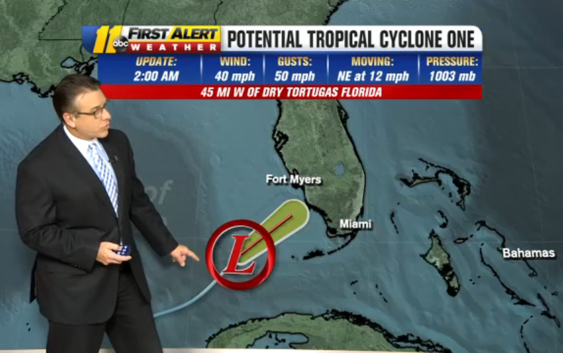- Fake job seekers are flooding the market, thanks to AI
- One set of evacuation orders lifted in Caldwell County after wildfire contained
- 'We gutted every building' | Chimney Rock rebuilding after Hurricane Helene
- 'We gutted every building' | Chimney Rock rebuilding after Hurricane Helene
- Debris from Hurricane Helene provides fuel, complicates containment for spring wildfires
Storm over Florida could become 'Alex' soon, National Hurricane Center says

According to the National Hurricane Center, Potential Tropical Cyclone One has sped up drastrically, now traveling more than 15 miles per hour, which is nearly triple the speed it was going 24 hours ago.
The system is now pushing over Florida, dumping heavy rain from south Florida up as far north as Orlando. The storm system has a 90 percent chance of becoming a tropical system. If that does happen, the system will be named Alex.
The storm system currently has maximum sustained winds of 40 miles per hour, with gusts up around 50 miles per hour.
SEE ALSO: Experts predict more active than average Atlantic hurricane season
The storm system is not going to cause major impacts in North Carolina. However, it will bring passing clouds inland Saturday and wind gusts will start picking up at the coast Sunday as the system makes its closest approach to the Tar Heel state.
All weekend, conditions in the water off the North Carolina coast could be dangerous. Waves will increase in size and the rip current threat will be high. Any swimmers should use extreme caution.
WATCH: First Alert to Hurricane Season
That naming convention may appear strange to some people, but it’s a common strategy the National Weather Service employs for some storm systems.
The systems that become Potential Tropical Cyclones are storm systems that have not yet become tropical in nature, but they are expected to do so in the not-so-distant future.
Using that naming convention allows the National Weather Service to issue watches and warnings and begin developing the storm’s cone of uncertainty. That allows the NWS to get an early start on warning people who are potentially in the storm’s path.
SEE ALSO: Get your emergency kit ready ahead of hurricane season
Copyright © 2022 WTVD-TV. All Rights Reserved.